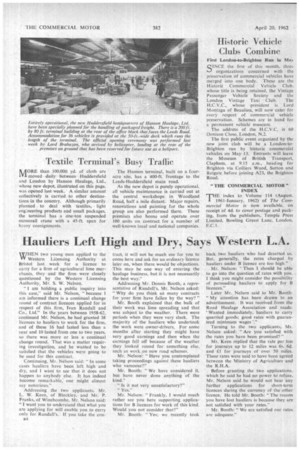Hauliers Left High and Dry, Says Western L.A.
Page 38

If you've noticed an error in this article please click here to report it so we can fix it.
WHEN two young men applied to the VY Western Licensing Authority at Bristol last week for a licence to carry for a firm of agricultural lime merchants, they and the firm were closely questioned by the Western Licensing Authority, Mr. S. W. Nelson.
"1 am holding a public inquiry into this case," said Mr, Nelson, "because I am itvformed there is a continual change round of contract licences applied for in respect of this firm, Ivan Randall and Co., Ltd." In the years between 1958-62, continued Mr. Nelson, he had granted 38 licences to hauliers to work for the firm, and of these 16 had lasted less than a year and 10 lasted from one to two years, so there was more or less a continual change round. That was a matter requiring investigation, and he wanted to be satisfied that the vehicles were going to be used for this contract.
Continuing, Me Nelson said: "In some cases hauliers have been left high and dry, and I want to see that it does not happen to anybody else. It has indeed become remarkable; one might almost say notorious."
Addressing the two applicants, Mr. L. W. Keen, of Blockley, and Mr. P. Franks, of Winchcombe, Mr. Nelson said: "I want you to understand that what you are applying for will enable you to carry only for Randall's. If you take the con
n4 tract, it will not be much use for you to come here and ask for an ordinary licence later on, when there would be objections. This may be one way of entering the haulage business, but it is not necessarily the best way."
Addressing Mr. Dennis Booth, a representative of Randall's, Mr. Nelson asked: " Why do you think so many contracts for your firm have fallen by the way? "
Mr. Booth explained that the bulk of their work was lime spreading and that was subject to the weather. There were periods when they were very slack. The majority of the hauliers who undertook the work were owner-drivers. For some months after starting they might have very good earnings and then when the earnings fell off because of the weather they looked round for something else, such as work on new road schemes.
Mr. Nelson: " Have you contemplated taking proceedings against these hauliers who vamoose?"
Mr. Booth: "We have considered ft, but have never done anything of the kind."
" Is it not very unsatisfactory?"
" Yes."
Mr. Nelson; "Frankly, I would much rather see you here supporting applications for B licences for work of this kind. Would you not consider that?"
Mr. Booth: "Yes we recently took back two hauliers who had deserted us. But, generally, the rates charged by hauliers under B licence are too high."
Mr. Nelson: "Then I should be able to go in.to the question of rates with you. I think you might consider the possibility of persuading hauliers to apply for B licences."
Later Mr. Nelson said to Mr. Booth: "My attention has been drawn to an advertisement. It was received from the Road Haulage Association and reads: 'Wanted immediately, hauliers to carry quarried goods; good rates with guaranteed minimum wages '."
Turning to the two applicants, Mr. Nelson asked: " Are you satisfied with the rates you have been promised?"
Mr. Keen replied that the rate per ton for journeys up to 12 miles was 6s, 6d. and El for journeys of over 50 miles. These rates were said to have been agreed between the Ministry of Agriculture and the R.H.A.
Before granting the two applications, which he said he had no power to refuse, Mr. Nelson said he would not hear any further applications for short-term licences during the currency of the other licence. He told Mr. Booth: The reason you have lost hauliers is because they are not satisfied with your rates."
Mr. Booth: "We are satisfied our rates are adequate."
















































































































